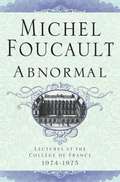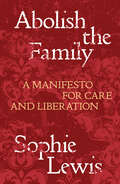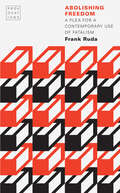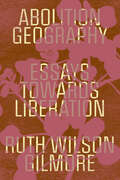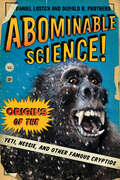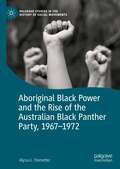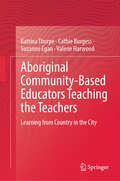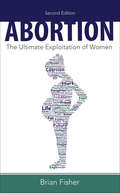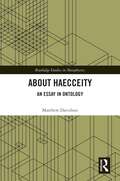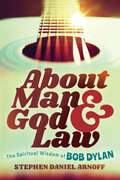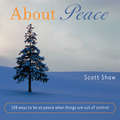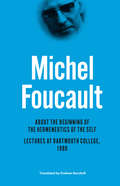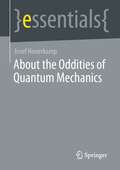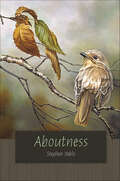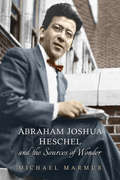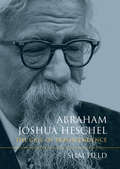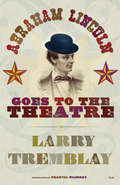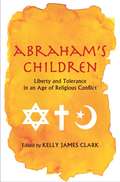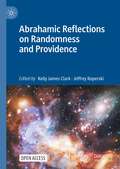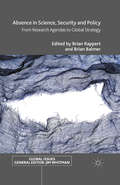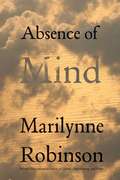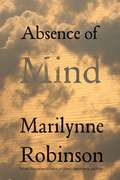- Table View
- List View
Abnormal: Lectures at the Collège de France 1974-1975
by Michel Foucault Graham Burchell Arnold I. DavidsonThe second volume in an unprecedented publishing event: the complete Collège de France lectures of one of the most influential thinkers of the last century Michel Foucault remains among the towering intellectual figures of postmodern philosophy. His works on sexuality, madness, the prison, and medicine are classics; his example continues to challenge and inspire. From 1971 until his death in 1984, Foucault gave public lectures at the world-famous Collège de France. These lectures were seminal events. Attended by thousands, they created benchmarks for contemporary critical inquiry. The lectures comprising Abnormal begin by examining the role of psychiatry in modern criminal justice, and its method of categorizing individuals who "resemble their crime before they commit it. " Building on the themes of societal self-defense in the first volume of this series, Foucault shows how and why defining "abnormality" and "normality" were prerogatives of power in the nineteenth century, shaping the institutions--from the prison system to the family--meant to deal in particular with “monstrosity,” whether sexual, phsyical, or spiritual. The Collège de France lectures add immeasurably to our appreciation of Foucault's thought, and offer a unique window on his singular worldview.
Abolish the Family: A Manifesto for Care and Liberation
by Sophie LewisWhat if we could do better than the family? We need to talk about the family. For those who are lucky, families can be filled with love and care, but for many they are sites of pain: from abandonment and neglect, to abuse and violence. Nobody is more likely to harm you than your family. Even in so-called happy families, the unpaid, unacknowledged work that it takes to raise children and care for each other is endless and exhausting. It could be otherwise: in this urgent, incisive polemic, leading feminist critic Sophie Lewis makes the case for family abolition. Abolish the Family traces the history of family abolitionist demands, beginning with nineteenth century utopian socialist and sex radical Charles Fourier, the Communist Manifesto and early-twentieth century Russian family abolitionist Alexandra Kollontai. Turning her attention to the 1960s, Lewis reminds us of the anti-family politics of radical feminists like Shulamith Firestone and the gay liberationists, a tradition she traces to the queer marxists bringing family abolition to the twenty-first century. This exhilarating essay looks at historic rightwing panic about Black families and the violent imposition of the family on indigenous communities, and insists: only by thinking beyond the family can we begin to imagine what might come after.
Abolishing Freedom: A Plea for a Contemporary Use of Fatalism (Provocations)
by Frank RudaPushing back against the contemporary myth that freedom from oppression is freedom of choice, Frank Ruda resuscitates a fundamental lesson from the history of philosophical rationalism: a proper concept of freedom can arise only from a defense of absolute necessity, utter determinism, and predestination.Abolishing Freedom demonstrates how the greatest philosophers of the rationalist tradition and even their theological predecessors—Luther, Descartes, Kant, Hegel, Freud—defended not only freedom but also predestination and divine providence. By systematically investigating this mostly overlooked and seemingly paradoxical fact, Ruda demonstrates how real freedom conceptually presupposes the assumption that the worst has always already happened; in short, fatalism. In this brisk and witty interrogation of freedom, Ruda argues that only rationalist fatalism can cure the contemporary sickness whose paradoxical name today is freedom.
Abolition Geography: Essays Towards Liberation
by Ruth Wilson GilmoreThe first collection of writings from one of the foremost contemporary critical thinkers on racism, geography and incarcerationGathering together Ruth Wilson Gilmore&’s work from over three decades, Abolition Geography presents her singular contribution to the politics of abolition as theorist, researcher, and organizer, offering scholars and activists ways of seeing and doing to help navigate our turbulent present. Abolition Geography moves us away from explanations of mass incarceration and racist violence focused on uninterrupted histories of prejudice or the dull compulsion of neoliberal economics. Instead, Gilmore offers a geographical grasp of how contemporary racial capitalism operates through an &“anti-state state&” that answers crises with the organized abandonment of people and environments deemed surplus to requirement. Gilmore escapes one-dimensional conceptions of what liberation demands, who demands liberation, or what indeed is to be abolished. Drawing on the lessons of grassroots organizing and internationalist imaginaries, Abolition Geography undoes the identification of abolition with mere decarceration, and reminds us that freedom is not a mere principle but a place. Edited with an introduction by Brenna Bhandar and Alberto Toscano.
Abominable Science!: Origins of the Yeti, Nessie, and Other Famous Cryptids
by Donald R. Prothero Daniel LoxtonThroughout our history, humans have been captivated by mythic beasts and legendary creatures. Tales of Bigfoot, the Yeti, and the Loch Ness monster are part of our collective experience. Now comes a book from two dedicated investigators that explores and elucidates the fascinating world of cryptozoology. Daniel Loxton and Donald R. Prothero have written an entertaining, educational, and definitive text on cryptids, presenting the arguments both for and against their existence and systematically challenging the pseudoscience that perpetuates their myths. After examining the nature of science and pseudoscience and their relation to cryptozoology, Loxton and Prothero take on Bigfoot; the Yeti, or Abominable Snowman, and its cross-cultural incarnations; the Loch Ness monster and its highly publicized sightings; the evolution of the Great Sea Serpent; and Mokele Mbembe, or the Congo dinosaur. They conclude with an analysis of the psychology behind the persistent belief in paranormal phenomena, identifying the major players in cryptozoology, discussing the character of its subculture, and considering the challenge it poses to clear and critical thinking in our increasingly complex world.
Abominable Science!: Origins of the Yeti, Nessie, and Other Famous Cryptids
by Donald R. Prothero Daniel Loxton&“A sharp analysis of the quest for unreal critters―cryptids, as they are called―and the people who pursue them . . . entertaining and thoroughly documented.&” —The Wall Street Journal Throughout our history, humans have been captivated by mythic beasts and legendary creatures. Tales of Bigfoot, the Yeti, and the Loch Ness monster are part of our collective experience. Now comes a book from two dedicated investigators that explores and elucidates the fascinating world of cryptozoology. Daniel Loxton and Donald R. Prothero have written an entertaining, educational, and definitive text on cryptids, presenting the arguments both for and against their existence and systematically challenging the pseudoscience that perpetuates their myths. After examining the nature of science and pseudoscience and their relation to cryptozoology, Loxton and Prothero take on Bigfoot; the Yeti, or Abominable Snowman, and its cross-cultural incarnations; the Loch Ness monster and its highly publicized sightings; the evolution of the Great Sea Serpent; and Mokele Mbembe, or the Congo dinosaur. They conclude with an analysis of the psychology behind the persistent belief in paranormal phenomena, identifying the major players in cryptozoology, discussing the character of its subculture, and considering the challenge it poses to clear and critical thinking in our increasingly complex world. &“As valuable for its analysis of the hunted as it is for the light it shines on the still-hopeful hunters.&” —Publishers Weekly &“Highly recommended for readers looking for scientific but accessible evaluations of the existence of five notable cryptids that have captured our imaginations.&” —Library Journal (starred review)
Aboriginal Black Power and the Rise of the Australian Black Panther Party, 1967-1972 (Palgrave Studies in the History of Social Movements)
by Alyssa L. TrometterExamining transnational ties between the USA and Australia, this book explores the rise of the Aboriginal Black Power Movement in the 1960s and early 1970s. Aboriginal adaptation of the American Black Power movement paved the way for future forms of radical Aboriginal resistance, including the eventual emergence of the Australian Black Panther Party. Through analysis of archival material, including untouched government records, previously unexamined newspapers and interviews conducted with both Australian and American activists, this book investigates the complex and varied process of developing the Black Power movement in a uniquely Australian context. Providing a social and political account of Australian activism across Victoria, New South Wales and Queensland, the author illustrates the fragmentation of Aboriginal Black Power, marked by its different leaders, protests and propaganda.
Aboriginal Community-Based Educators Teaching the Teachers: Learning from Country in the City
by Suzanne Egan Valerie Harwood Katrina Thorpe Cathie BurgessThis book showcases the transformative impact of Aboriginal community-based educators teaching local histories and cultures to preservice teachers. It details the &‘Learning from Country in the City&’ teaching and research project, which follows preservice teachers who participated in immersive &‘Learning from Country&’ experiences in undergraduate Aboriginal education electives through to their first few years of teaching. Through storying Aboriginal community-based educator, preservice and early career teacher, and lecturer experiences, this book demonstrates the educational and emotional impact of Aboriginal truth telling processes and the significance of connecting with and learning from Country for all teachers and students. A visual representation of the pedagogical framework articulates this work which is designed to capture localised place-based learning processes and apply these principles to diverse contexts. The book presents photographs and maps of the places at the centre of this learning so educators, community members and readers can visualise how they might apply this methodology to their context. Importantly, this book positions Indigenous Knowledges, Aboriginal voices and ways of knowing, being and doing front and centre - asserting that this is essential foundational work needed to prepare young people for living in an ever-changing world.
Abortion, Execution, and the Consequences of Taking Life
by James D. SlackThis book focuses on the relationship between public morality and personal action in the American political community. It emphasizes the responsibilities of citizens and government to find and confirm truth, looking to specific sources: religious scripture and empirical events. Recognizing that we have a natural preference for distraction and distance from both sources of truth, Slack uses qualitative, open-ended interviews and direct observation to uncover the intimate consequences of life-taking in open societies.Abortion and murder/capital punishment are instances in which there is a sequence of events that result in life-taking. The act of murder denies the sanctity of life of someone else. Abortion and capital punishment also deny the sanctity of the lives of others. The intimacy of life-taking is not typically acknowledged or remains hidden. This makes it difficult to assess the consequences for victims, survivors, and the political community as a whole. As a result, there is only a tenuous link between public actions that question the sanctity of human life and the moral compass professed by the American democracy.The volume presumes a theocentric foundation envisioned by the American Founders. It explores the model's first source of truth, biblical scripture, as it applies to the public actions of murder, abortion, and capital punishment. Then it investigates the intimate reality of these acts. These realities are examined in a variety of settings, resulting in a mosaic pattern of public action about capital punishment and abortion. Slack underscores the importance of government's role of providing outward justice, as well as the citizen's responsibility to be supportive of government tasks in order to reconcile the reality of life-taking with the moral compass professed in the American political community.
Abortion: The Ultimate Exploitation of Women
by Brian FisherThe author of Deliver Us from Abortion presents a five-point plan for men to put an end to abortion in America for women, men, and family.Do men have a stake in the abortion debate? Modern culture says no but author Brian Fisher shows why men are very much an interested party. Men led the campaign to legalize abortion—harming and exploiting women in the process. Now, he says, men must lead the effort to end the exploitation by ending abortion. And he presents a plan to do so. This revised and expanded second edition presents a more complete picture of how men target and exploit women globally, how this oppression is deeply connected to abortion, and how men can be, are, and should be a part of the solution.
About Haecceity: An Essay in Ontology (Routledge Studies in Metaphysics)
by Matthew DavidsonThis book offers an in-depth and updated examination of the nature of haecceity—that primitive entity which explains why something is distinct from other things.The book begins by exploring different conceptions of haecceity throughout history. The discussion of various figures across history is important for getting clear on the nature of haecceity and its role in individuation. The next part of the book examines different views about the nature of haecceity. The author defends a view on which haecceities have objects that instantiate them as constituents. Following that, the book considers arguments for and against the existence of haecceities, the epistemology of haecceity, and the distinction between qualitative and non-qualitative properties.About Haecceity will appeal to scholars and advanced students working in metaphysics, philosophy of language, epistemology, logic, and history of philosophy.
About Man and God and Law: The Spiritual Wisdom of Bob Dylan
by Stephen Daniel ArnoffAbout Man and God and Law is the story of how Bob Dylan sparked a revolution of the spirit and why it matters today.Many of our assumptions about empathy, sensual pleasure, and the essence of work, community, country, race, and the divine have germinated in Bob Dylan’s need to know what’s blowing in the wind and how it feels. Tracing his work and vision through themes that have shaped religious and cultural history for millennia, Stephen Daniel Arnoff uncovers how Bob Dylan has re-enchanted ancient questions of meaning and purpose throughout popular culture, inspiring a pantheon of prophetic musicians along the way. This field guide to Dylan's spiritual wisdom aims to make good on the promise that if we look closely enough at his body of work—precisely at a moment when the world we thought we knew seems like uncharted territory—we can open up our eyes to see not only where we really are, but where we need to go.
About Peace: 108 Ways to Be at Peace When Things Are Out of Control
by Scott ShawThese Zen meditations for modern times can help you find calm amid chaos. Conflict is a part of life. Zen Buddhism was even founded in conflict. No one can give anyone else peace: It comes to those who seek it—in the moment and for the moment only. But even as the pace accelerates and problems escalate, it&’s possible to gain inner peace. The past is gone and the future is unknown—so there&’s no time like the present to use these 108 meditations. They offer a very contemporary respite from internal and external conflict, well suited to the breakneck pace of life today. Their number and their form, however, is steeped in tradition. One hundred and eight is a sacred number in Buddhism, in which there is also the tradition of meditating with malas, strung beads which come in multiples of nine—27, 56, or 108. Their form follows Buddhist tradition as well: They are modern koans, or riddles to ponder, and dharma stories.
About the Beginning of the Hermeneutics of the Self: Lectures at Dartmouth College, 1980
by Michel FoucaultIn 1980, Michel Foucault began a vast project of research on the relationship between subjectivity and truth, an examination of conscience, confession, and truth-telling that would become a crucial feature of his life-long work on the relationship between knowledge, power, and the self. The lectures published here offer one of the clearest pathways into this project, contrasting Greco-Roman techniques of the self with those of early Christian monastic culture in order to uncover, in the latter, the historical origin of many of the features that still characterize the modern subject. They are accompanied by a public discussion and debate as well as by an interview with Michael Bess, all of which took place at the University of California, Berkeley, where Foucault delivered an earlier and slightly different version of these lectures. Foucault analyzes the practices of self-examination and confession in Greco-Roman antiquity and in the first centuries of Christianity in order to highlight a radical transformation from the ancient Delphic principle of “know thyself” to the monastic precept of “confess all of your thoughts to your spiritual guide.” His aim in doing so is to retrace the genealogy of the modern subject, which is inextricably tied to the emergence of the “hermeneutics of the self”—the necessity to explore one’s own thoughts and feelings and to confess them to a spiritual director—in early Christianity. According to Foucault, since some features of this Christian hermeneutics of the subject still determine our contemporary “gnoseologic” self, then the genealogy of the modern subject is both an ethical and a political enterprise, aiming to show that the “self” is nothing but the historical correlate of a series of technologies built into our history. Thus, from Foucault’s perspective, our main problem today is not to discover what “the self” is, but to try to analyze and change these technologies in order to change its form.
About the Oddities of Quantum Mechanics (essentials)
by Josef HonerkampQuantum mechanics is a physical theory for objects of the microcosm, e.g. for atoms or electrons. It has proven itself so far, but leads to the fact that we have to grant properties and relations to these objects, which are neither compatible with our common sense nor with the concepts of classical physics. These peculiarities are presented and their meaning for our cognitive faculty and for a world view is discussed.This Springer essential is a translation of the original German 1st edition essentials, Über die Merkwürdigkeiten der Quantenmechanik by Josef Honerkamp, published by Springer Fachmedien Wiesbaden GmbH, part of Springer Nature in 2020. The translation was done with the help of artificial intelligence (machine translation by the service DeepL.com). A subsequent human revision was done primarily in terms of content, so that the book will read stylistically differently from a conventional translation. Springer Nature works continuously to further the development of tools for the production of books and on the related technologies to support the authors.
Aboutness (Carl G. Hempel Lecture Series #3)
by Stephen YabloAboutness has been studied from any number of angles. Brentano made it the defining feature of the mental. Phenomenologists try to pin down the aboutness-features of particular mental states. Materialists sometimes claim to have grounded aboutness in natural regularities. Attempts have even been made, in library science and information theory, to operationalize the notion. But it has played no real role in philosophical semantics. This is surprising; sentences have aboutness-properties if anything does. Aboutness is the first book to examine through a philosophical lens the role of subject matter in meaning. A long-standing tradition sees meaning as truth-conditions, to be specified by listing the scenarios in which a sentence is true. Nothing is said about the principle of selection--about what in a scenario gets it onto the list. Subject matter is the missing link here. A sentence is true because of how matters stand where its subject matter is concerned. Stephen Yablo maintains that this is not just a feature of subject matter, but its essence. One indicates what a sentence is about by mapping out logical space according to its changing ways of being true or false. The notion of content that results--directed content--is brought to bear on a range of philosophical topics, including ontology, verisimilitude, knowledge, loose talk, assertive content, and philosophical methodology. Written by one of today's leading philosophers, Aboutness represents a major advance in semantics and the philosophy of language.
Abraham Joshua Heschel and the Sources of Wonder
by Michael MarmurAbraham Joshua Heschel (1907-1972) was one of the twentieth century's most influential Jewish thinkers, a respected theologian and enthusiastic civil rights activist who marched to Selma with Martin Luther King, Jr. His theology emphasized the immediacy of wonder and awe, yet his writing was studded with signs of his vast knowledge of traditional scholarship. No other Jewish thinker of note in the twentieth century used such a wide range of texts so extensively. Abraham Joshua Heschel and the Sources of Wonder is the first book to demonstrate how Heschel's political, intellectual, and spiritual commitments were embedded in his reading of Jewish tradition. By shedding new light on how Heschel's theological project reconciled the demands of tradition and the modern world, Michael Marmur offers an inspirational lesson in how contemporary Jewish thought can embrace both the texts of the past and the challenges of the present.
Abraham Joshua Heschel: The Call of Transcendence
by Shai Held&“Through Heschel, Held&’s work reaches out more broadly to treat us to a profound discussion of the great issues in contemporary Jewish theology&” (Arthur Green, Hebrew College Rabbinical School). Abraham Joshua Heschel (1907–1972) was a prolific scholar, impassioned theologian, and prominent activist who participated in the black civil rights movement and the campaign against the Vietnam War. He has been hailed as a hero, honored as a visionary, and endlessly quoted as a devotional writer. In this sympathetic, yet critical, examination, Shai Held elicits the overarching themes and unity of Heschel&’s incisive and insightful thought. Focusing on the idea of transcendence—or the movement from self-centeredness to God-centeredness—Held puts Heschel into dialogue with contemporary Jewish thinkers, Christian theologians, devotional writers, and philosophers of religion. &“Shai Held&’s book is a master class in one of the most significant Jewish voices of our time.&” —Tablet &“In this lucid and elegant study, one of the keenest minds in Jewish theology in our time probes the vision of one of the most profound spiritual writers of the twentieth century, uncovering a unity that others have missed and shedding light not only on Heschel but also on the characteristically modern habits of mind that impede the knowledge of God. The book is especially valuable for the connections it draws with other philosophers, theologians, and spiritual writers, Jewish and Christian. Enthusiastically recommended!&” —Jon D. Levenson, Harvard University &“[A] thoughtful, illuminating new study of Heschel&’s thought . . . It is one of the many virtues of Shai Held&’s book that it helps us to place Heschel alongside not only Kaplan but Halevi, Horovitz, and Rav Nahman―as well as the Psalmist.&” —Jewish Review of Books
Abraham Lincoln Goes to the Theatre
by Chantal Bilodeau Larry TremblayAbsurd, hilarious and haunting, Abraham Lincoln Goes to the Theatre is an unforgettable mystery that asks the question: How can we ever know who we are and what is true when the world we know is shifting beneath us? Its answer is simple: John Wilkes Booth was the ?rst American star-the actor who kidnapped reality to transform it into theatre.
Abraham's Children
by Kelly James ClarkScarcely any country in today's world can claim to be free of intolerance. Israel and Palestine, Northern Ireland, Sudan, the Balkans, Pakistan, India, Sri Lanka, and the Caucasus are just some of the areas of intractable conflict apparently inspired or exacerbated by religious differences. Can devoted Jews, Christians, or Muslims remain true to their own fundamental beliefs and practices, yet also find paths toward liberty, tolerance, and respect for those of other faiths? In this vitally important book, fifteen influential practitioners of the Abrahamic religions address religious liberty and tolerance from the perspectives of their own faith traditions. Former president Jimmy Carter, Rabbi Arik Ascherman, Indonesia’s first democratically elected president, Abdurrahman Wahid, and the other writers draw on their personal experiences and on the sacred writings that are central in their own religious lives. Rather than relying on "pure reason," as secularists might prefer, the contributors celebrate religious traditions and find within them a way toward mutual peace, uncompromised liberty, and principled tolerance. Offering a counterbalance to incendiary religious leaders who cite Holy Writ to justify intolerance and violence, the contributors reveal how tolerance and respect for believers in other faiths stand at the core of the Abrahamic traditions.
Abrahamic Reflections on Randomness and Providence
by Kelly James Clark Jeffrey KoperskiThis open access book addresses the question of how God can providentially govern apparently ungovernable randomness. Medieval theologians confidently held that God is provident, that is, God is the ultimate cause of or is responsible for everything that happens. However, scientific advances since the 19th century pose serious challenges to traditional views of providence. From Darwinian evolution to quantum mechanics, randomness has become an essential part of the scientific worldview. An interdisciplinary team of Muslim, Christian and Jewish scholars—biologists, physicists, philosophers and theologians—addresses questions of randomness and providence.
Abregé de philosophie
by Dieudonné NassaL'objectif majeur de ce document est de donner aux candidats au baccalauréat les moyens de réussir l'épreuve de philosophie. Il est aussi, destiné aux élèves des classes de première dans un style simplifié pour comprendre les notions du programme et pour les élèves des classes de seconde, l'essentiel à maîtriser et à retenir sur les principaux auteurs. Le document comprend plusieurs éléments d'informations qui sont les suivants : -la méthodologie de la dissertation et du commentaire de texte ; -des cours développés entièrement, de même que des résumés de cours ; -des textes et des sujets de réflexion ; -une présentation des principaux auteurs du programme.
Absence in Science, Security and Policy: From Research Agendas to Global Strategy (Global Issues)
by Brian Rappert Brian BalmerThis book explores the absent and missing in debates about science and security. Through varied case studies, including biological and chemical weapons control, science journalism, nanotechnology research and neuroethics, the contributors explore how matters become absent, ignored or forgotten and the implications for ethics, policy and society.The chapter 'Sensing Absence: How to See What Isn't There in the Study of Science and Security' is open access under a CC BY 4.0 license via link.springer.com.
Absence of Mind: The Dispelling of Inwardness from the Modern Myth of the Self
by Marilynne RobinsonEssays from the lectures delivered at Yale University, the Dwight Harrington Terry Foundation. Includes bibliographical references.
Absence of Mind: The Dispelling of Inwardness from the Modern Myth of the Self
by Marilynne RobinsonIn this ambitious book, acclaimed writer Marilynne Robinson applies her astute intellect to some of the most vexing topics in the history of human thought--science, religion, and consciousness. Crafted with the same care and insight as her award-winning novels, Absence of Mind challenges postmodern atheists who crusade against religion under the banner of science. In Robinson's view, scientific reasoning does not denote a sense of logical infallibility, as thinkers like Richard Dawkins might suggest. Instead, in its purest form, science represents a search for answers. It engages the problem of knowledge, an aspect of the mystery of consciousness, rather than providing a simple and final model of reality. By defending the importance of individual reflection, Robinson celebrates the power and variety of human consciousness in the tradition of William James. She explores the nature of subjectivity and considers the culture in which Sigmund Freud was situated and its influence on his model of self and civilization. Through keen interpretations of language, emotion, science, and poetry, Absence of Mind restores human consciousness to its central place in the religion-science debate.
